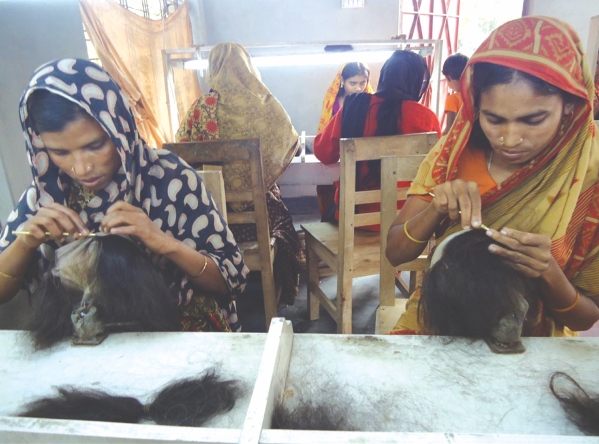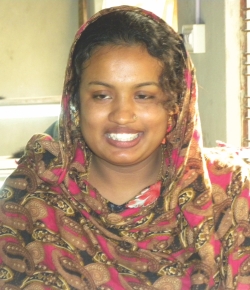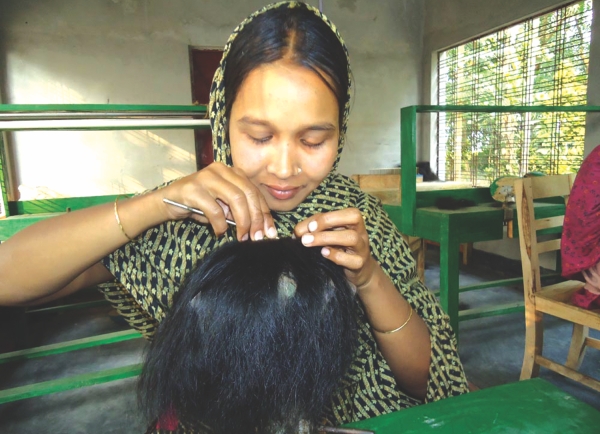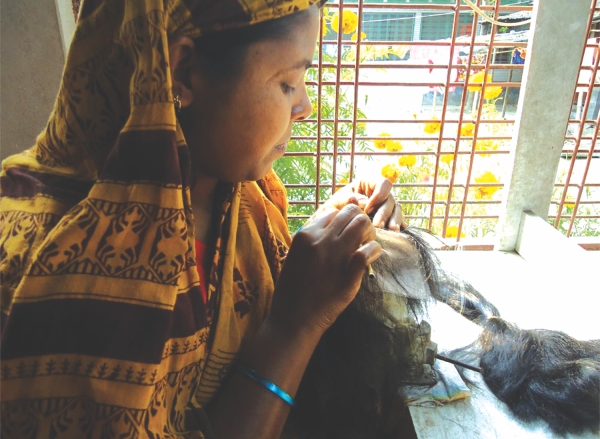Cover Story

Pabna
Making a Living with Waste Hair
The ability to make use of things we throw away is perhaps the most important feat of innovation in today's world, where there is an ever-increasing need to make the most out of the resources we have. This fortnight's Star Insight presents a curious tale of women of Chatmohar Upazila of Pabna who have found a way to make a living with waste human hair. Rabeya, Karina and Parvin are Degree students of the local college who, along with three dozen other women, are weaving wigs from discarded human hair to sustain their education, under the supervision of Arzina Akter Khushi.
.................................................................................................
Ahmed Humayun Kabir Topu
 |
Arzina Akter Khushi |
Around three dozen women living in poverty at Mostalipur village of Chatmohar Upazila in Pabna have found respite from collecting discarded human hair, sorting them and ultimately weaving them into wigs for bald headed people and for those in the fashion industry. The ones like Rabeya, Karina and Parvin have found a means through such work to pay for their college education and to be able to provide for their families. This initiative is quite new in the region and is enabling those involved to bring about a positive change to their standards of living.
The woman behind the initiative, Arzina Akter Khushi from the same village, started the small business by setting up a factory at her home. She is the pioneer and sole provider of hair caps from the area. Khushi trained each woman working in her factory herself and has given them a chance to earn an income, contributing to the society on a grand scale. Khushi's small-scale contribution is improving economic participation of women is laudable.
Khushi had herself received training in the trade in the past year. She had taken the knowledge learned from Gazipur, Dhaka to her village with the sole purpose of starting her own business; in the process, alleviating her neighbours from their miseries. Her inspiration came from her husband, Alamin, who leads the Hair Fashion Company in Gazipur. Coming back to her village home, Khushi turned her dream of self-employment and empowering the women there into reality.
Khushi recollected her memories saying, “I was fortunate enough to have met many women at my husband's factory who were adept and well trained in making wigs. I had immediately thought of learning the trade myself to put it to good use. I dreamt of coming back to my village and train the many women living here in much hardship on a daily basis. I had started off with only eight employees, as many of them were skeptical and didn't give the job a second thought. But with passing time, as these women got trained and once their skill started paying off, the trade became more acceptable to the community. Now I have a few dozen women working for me, trying to improve their livelihood.”

Workers busy weaving wig at the factory under watchful eye of Khushi
“I have always chosen the poorest of women first, as they were most in need of work and also the most eager to learn. The people I started off with always provided their labor in an honest fashion and helped to inspire others in learning the craft. I have trained a total of 40 women so far, of which 35 are still working at my factory”,
Khushi's factory is very simple, constructed out of her own efforts. It contains a total of one dozen knitting tables, on each of which up to four hard knitters can work at a time. Her factory produces 100 to 150 hair caps every month, and Khushi is hopeful that her business will grow further in the not-so-distant future.

She expressed some mixed feelings, saying, “The women working in my factory are yet to become professionals in this field. They are still not as fast as they should be. It takes each woman 15 to 16 hours to complete one hair cap on the net frames. As they are all family women, they end up requiring a whole month to complete only 5 to 6 caps. But I understand that they have to take care of their families as well, besides working under me. At the end of they day, they are really trying their best. But I expect their productivity to rise in the future.”
Describing her own family obligations, Khushi expressed that she runs the factory to generate extra income for her own family like all the others. Khushi has made sure that her family is far better off than in the past.
On an average, each woman earns between Tk. 350 and 370 presently for each cap they successfully finish. This ensures them an earning between Tk. 1,800 and 2,500 every month. Khushi says that the income will definitely go up for each worker if they are able to provide more time to the job, and with productivity. Nazma Khatun, one such worker is now able to dream of education for her children, which was not possible before joining the trade.

Khushi buys discarded human hair at a rate that varies from Tk. 6,000 to 7,000 per kg. The hair is collected from various beauty-parlors and hair salons across the country with the help of her husband. The collected hair is first washed and processed with various chemicals for hygiene purposes before being weaved into the periwigs. Each wig requires from 100 to 150 grams of hair, which are weaved onto the frame. The caps are then shaped using a machine according to various sizes in demand. The manufacturing cost for each cap amounts to Tk. 1,000 to 1,200, including labor costs, which are then sold for Tk. 1,400 each. The small entrepreneur ends up making a monthly profit of just above Tk. 20,000 from the small factory.
Overall, the residents of the village are very happy and revere Khushi for her visionary initiative. Md. Isharat Ali, one of the village doctors and cultural activists says, “This initiative taken up by Khushi has definitely empowered many women in this village. There is very little scope here for making a living besides being in the agri-sector, and Khushi has provided an alternative to the poorest of these women to make a living for themselves and their families. And as these wigs are export quality products, we can expect this endeavor to definitely have a positive impact on the development of Mostalipur.”
Copyright
(R) thedailystar.net 2011
|





